初中英语句型转换大全
初中英语知识点归纳常用句型及句式转换

初中英语知识点归纳常用句型及句式转换英语学习中,句型和句式是非常重要的基础知识。
掌握常用的句型和灵活运用句式可以帮助我们更好地理解英语语法和提高语言表达能力。
下面是初中英语中常见的句型和句式转换的归纳总结。
一、肯定句和否定句的转换1. 肯定句:主语 + 动词 + 其他成分否定句:主语 + 助动词 do/does/did + not + 动词 + 其他成分例句:He is a doctor.(肯定句)He is not a doctor.(否定句)2. 肯定句:主语 + am/is/are + 名词/形容词 + 其他成分/地点/时间否定句:主语 + am/is/are + not + 名词/形容词 + 其他成分/地点/时间例句:They are students.(肯定句)They are not students.(否定句)3. 肯定句:主语 + 动词 + 副词/介词短语 + 其他成分否定句:主语 + 助动词 do/does/did + not + 动词 + 副词/介词短语 + 其他成分例句:She speaks English fluently.(肯定句)She does not speak English fluently.(否定句)二、一般疑问句和特殊疑问句的转换1. 一般疑问句:肯定句:Do/Does/Did + 主语 + 动词 + 其他成分?否定句:Do/Does/Did + 主语 + 动词 + not + 其他成分?特殊疑问句:疑问词 + 一般疑问句的语序例句:She goes to school by bus.(一般疑问句)Does she go to school by bus?(特殊疑问句)2. 一般疑问句:肯定句:Am/Is/Are + 主语 + 名词/形容词 + 其他成分/地点/时间?否定句:Am/Is/Are + 主语 + not + 名词/形容词 + 其他成分/地点/时间?特殊疑问句:疑问词 + 一般疑问句的语序例句:They are students.(一般疑问句)Are they students?(特殊疑问句)3. 一般疑问句:肯定句:助动词 + 主语 + 动词 + 副词/介词短语 + 其他成分?否定句:助动词 + Do/Does/Did + 主语 + 动词 + not + 副词/介词短语 + 其他成分?特殊疑问句:疑问词 + 一般疑问句的语序例句:He speaks English fluently.(一般疑问句)Does he speak English fluently?(特殊疑问句)三、陈述句和祈使句的转换1. 陈述句:主语 + 动词 + 其他成分祈使句:动词 + 其他成分(一般省略主语 you)例句:They play football.(陈述句)Play football.(祈使句)2. 陈述句:主语 + am/is/are + 名词/形容词 + 其他成分/地点/时间祈使句:Be + 名词/形容词 + 其他成分/地点/时间例句:You are a student.(陈述句)Be a student.(祈使句)3. 陈述句:主语 + 动词 + 副词/介词短语 + 其他成分祈使句:动词 + 副词/介词短语 + 其他成分例句:She speaks English fluently.(陈述句)Speak English fluently.(祈使句)通过以上的归纳总结,我们可以更好地理解和运用常用的句型和句式转换。
初中英语句型转换类型总结
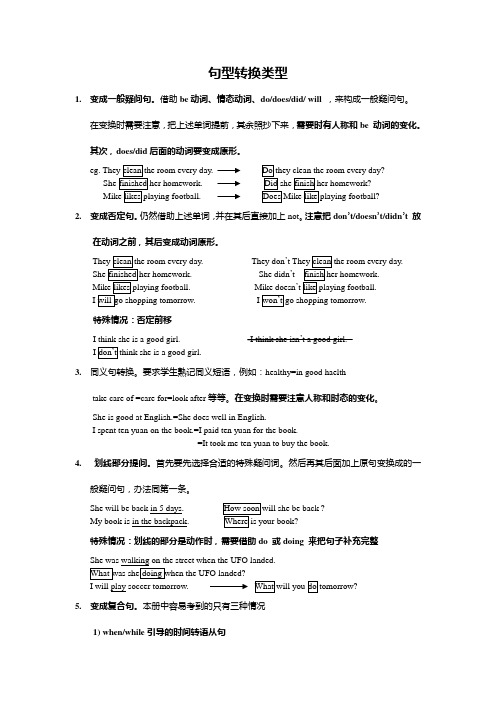
句型转换类型1.变成一般疑问句。
借助be动词、情态动词、do/does/did/ will ,来构成一般疑问句。
在变换时需要注意,把上述单词提前,其余照抄下来,需要时有人称和be 动词的变化。
其次,does/did后面的动词要变成原形。
2.变成否定句。
仍然借助上述单词,并在其后直接加上not。
注意把don’t/doesn’t/didn’t 放在动词之前,其后变成动词原形。
They don’She didn’tMike doesn’特殊情况:否定前移I think she is a good girl. I think she isn’t a good girl.3.同义句转换。
要求学生熟记同义短语,例如:healthy=in good haelthtake care of =care for=look after等等。
在变换时需要注意人称和时态的变化。
She is good at English.=She does well in English.I spent ten yuan on the book.=I paid ten yuan for the book.=It took me ten yuan to buy the book.4.划线部分提问。
首先要先选择合适的特殊疑问词。
然后再其后面加上原句变换成的一般疑问句,办法同第一条。
She will be back in 5 days.My book is in the backpack.特殊情况:划线的部分是动作时,需要借助do 或doing 来把句子补充完整She was walking on the street when the UFO landed.I will play soccer tomorrow.5. 变成复合句。
本册中容易考到的只有三种情况1) when/while引导的时间转语从句She was coolong. Mary came home.2) if 引导的条件状语从句(注意主句、从句使用的时态不同)有or, if 引导的用否定)Work hardIf you work hard, you will pass the exam. (有and, if 引导的用肯定)3)直接引语变成间接引语。
初一英语句型转换

初一英语句型转换的专项练习练习一:肯定句变否定句1.He is a student.He is not a student.2.They like playing football.They don't like playing football.3.She can sing a song.She can't sing a song.练习二:陈述句变一般疑问句1.I am from China.Are you from China?2.He has a new bike.Does he have a new bike?3.They are watching TV.Are they watching TV?练习三:划线部分提问1.The book is on the desk. (划线部分为on the desk)Where is the book?2.He is my brother. (划线部分为my brother)Who is he?3.They are five yuan. (划线部分为five yuan)How much are they?— 1 —练习四:同义句转换1.It's time for lunch.It's time to have lunch.2.He is tall and thin.He is a tall and thin man.3.What's your name?May I know your name?以上是一些初一英语句型转换的专项练习,包括肯定句变否定句、陈述句变一般疑问句、划线部分提问和同义句转换等。
通过这些练习,你可以更好地掌握英语句型的变换规律,提高你的英语水平。
记得多做练习,多思考,相信你会越来越擅长英语句型转换的!— 2 —。
七年级英语句型转换1-100附答案
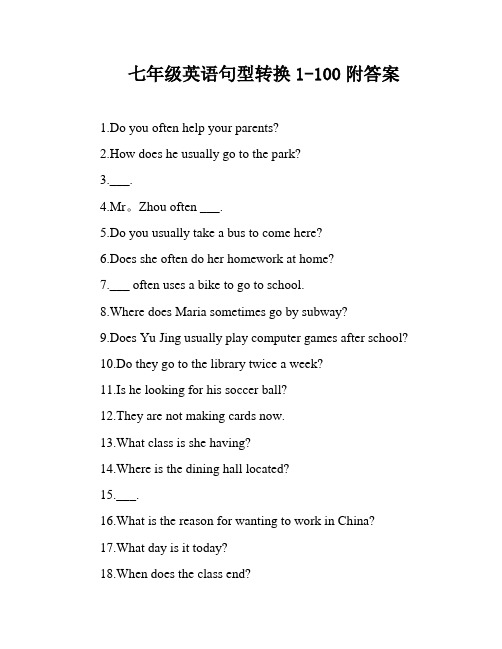
七年级英语句型转换1-100附答案1.Do you often help your parents?2.How does he usually go to the park?3.___.4.Mr。
Zhou often ___.5.Do you usually take a bus to come here?6.Does she often do her homework at home?7.___ often uses a bike to go to school.8.Where does Maria sometimes go by subway?9.Does Yu Jing usually play computer games after school?10.Do they go to the library twice a week?11.Is he looking for his soccer ball?12.They are not making cards now.13.What class is she having?14.Where is the dining hall located?15.___.16.What is the reason for wanting to work in China?17.What day is it today?18.When does the class end?19.What subject are you currently studying?20.How many lessons do they have every day?21.There is no picture on the wall.22.What is she making?23.There are boys in the room.24.Does Tom have books?25.___.26.How many days are there in a week?27.Where are your shoes located?28.Are there any books and a pen on my desk?29.Would you like to go to school by bus?30.What is on the table near the window?31.What is in the living room?32.There are no computers in our school.33.Is your study on the first floor or the second floor?34.Where are your books?___.36.There are some old men in the room.37.There is no meat on the plate.38.Is there a map of Beijing on the wall。
初中易考知识点基本句型的变换

初中易考知识点基本句型的变换句子是语言交流的基本单位,句型的变换在英语学习中起着重要的作用。
通过灵活运用不同的句型变换,可以丰富句子表达,增加句子的多样性和变化性。
本文将探讨初中易考的基本句型及其变换方式,帮助同学们掌握句型的变化技巧。
一、陈述句的变换1. 陈述句变一般疑问句陈述句变一般疑问句时,只需将主语与谓语动词的位置进行互换,同时在句尾加上问号。
示例:陈述句:She is a doctor.一般疑问句:Is she a doctor?2. 陈述句变否定句陈述句变否定句时,在谓语动词前面加上否定词"Not"。
示例:陈述句:He likes playing basketball.否定句:He does not like playing basketball.3. 陈述句变祈使句陈述句变祈使句时,除去主语,将谓语动词直接使用原形,表示一种命令、请求或建议。
示例:陈述句:You should study hard.祈使句:Study hard.二、疑问句的变换1. 一般疑问句变陈述句一般疑问句变陈述句时,将疑问句中的助动词或情态动词去掉。
示例:一般疑问句:Do you like ice cream?陈述句:You like ice cream.2. 特殊疑问句变陈述句特殊疑问句变陈述句时,将特殊疑问句中的疑问词与句子其他部分保持原来顺序即可。
示例:特殊疑问句:Where is the library?陈述句:The library is at the corner of the street.三、否定句的变换1. 否定句变陈述句否定句变陈述句时,去掉否定词"Not"。
示例:否定句:He does not like playing soccer.陈述句:He likes playing soccer.2. 否定句变一般疑问句否定句变一般疑问句时,只需将否定词"Not"与陈述句的其他部分交换位置即可。
中考英语丨初中英语句型转换大全

中考英语丨初中英语句型转换大全展开全文一、陈述句与疑问句、祈使句、感叹句间的转换1、陈述句中肯定句变为否定句,大部分是用not来改变谓语结构,但也有借用否定意义的词,如nothing, nobody, none, neither, little, few, never, hardly等,例如:A:T om does well in maths.B:Tom doesn't do in maths.A:He has much to do.B:He has nothing to do.A:All of my classmates like art.B:None of my classmates likes art.2、改为疑问句。
根据上下句的结构和词的减少,来判断变为哪一种形式的疑问句。
例如:A:My brother often has breakfast at school.B: Does your brother often have breakfast at school?A:T om's already weak in English.B:Tom's already weak in English, isn't he ?A:The red light changes every two minutes.B:How often does the red light change?3、改为感叹句。
根据所给的句子结构和单词的词性,来确定使用哪一种感叹句的形式,例如:A:This is an interesting book.B:What an interesting book this is!或 How interesting this book is!二、同义句转换。
根据上句,写出一个意思相同(或相近)的下句,此类形式繁多,内容复杂,涉及面广,归类如下:1、同义词或词组之间的转换。
初中英语句型转换(陈述句变一般疑问句特殊疑问句及练习)
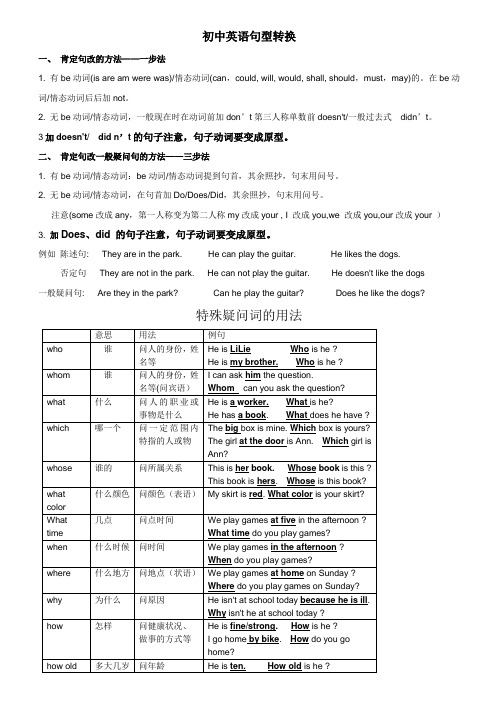
3 加 doesn't/ did n’t 的句子注意,句子动词要变成原型。
二、 肯定句改一般疑问句的方法——三步法
1. 有 be 动词/情态动词:be 动词/情态动词提到句首,其余照抄,句末用问号。
2. 无 be 动词/情态动词,在句首加 Do/Does/Did,其余照抄,句末用问号。
注意(some 改成 any,第一人称变为第二人称 my 改成 your , I 改成 you,we 改成 you,our 改成 your )
My book is over there. Whose book is over there ?
主语的定语 主语 谓语
疑问词 主语 谓语
以上两点方法都是:
用正确的疑问词代替画线部分,再把句号改为问号,其余部分一般不做改变
3.对表语或宾语的定语部分提问,其语序是:
疑问词+表语或宾语(画线部分所修饰的名词)+一般疑问句(省略画线部分和它所修饰的名词)
一般疑问句: Are they in the park?
Can he play the guitar?
Does he like the dogs?
综合练习: 1. The children have a good time in the park. 否定句:___________________________________ 一般疑问句:___________________________________ 2. There are about nine hundred people at the concert.(音乐会) 否定句:_________________________________ 一般疑问句:________________________________________ 对划线部分提问:____________________________________ 3. There is only one problem. 否定句:_____________________________________ 一般疑问句:________________________________________ 肯定/否定回答:____________________________________ 4. Ann does her homework every evening. 否定句:__________________________________________ 一般疑问句:________________________________________ 对划线部分提问:____________________________________ 5. I read an English book every day. 否定句:__________________________________________ 一般疑问句:________________________________________ 肯定/否定回答:____________________________________ 对划线部分提问:____________________________________ 6. My brother is in the park now. 否定句:____________________________________ 一般疑问句:________________________________________ 肯定/否定回答:__________________________ 对划线部分提问:____________________________________ 7. She has some bread for lunch today. 否定句:__________________________________________ 一般疑问句:_________________________________ 肯定/否定回答:____________________________________ 8. They read English every day. 否定句:___________________________________ 一般疑问句:________________________________________ 肯定/否定回答:____________________________________ 对划线部分提问:____________________________________
初一英语句型转换大全

初一英语句型转换大全Title: Junior High English Sentence Transformation Guide.Introduction.Sentence transformation in English is an essentialskill that helps students enhance their language proficiency and creativity. It involves converting a given sentence into another form without changing its original meaning. This guide covers various sentence transformation techniques suitable for junior high students, providing examples and explanations to aid understanding.1. Active Voice to Passive Voice.Active Voice: John wrote a book.Passive Voice: A book was written by John.Explanation: In the active voice, the subject performs the action, while in the passive voice, the action is performed on the subject.2. Simple Sentence to Compound Sentence.Simple Sentence: She is smart. She studies hard.Compound Sentence: She is smart and studies hard.Explanation: A simple sentence has one subject and one predicate. A compound sentence combines two or more simple sentences using coordinating conjunctions.3. Direct Speech to Indirect Speech.Direct Speech: "I am coming," he said.Indirect Speech: He said that he was coming.Explanation: Direct speech is when someone speaks directly to the listener, while indirect speech reportswhat someone said without using quotation marks.4. Affirmative Sentence to Negative Sentence.Affirmative Sentence: She is a doctor.Negative Sentence: She is not a doctor.Explanation: An affirmative sentence asserts a fact, while a negative sentence denies it.5. Declarative Sentence to Interrogative Sentence.Declarative Sentence: He is a teacher.Interrogative Sentence: Is he a teacher?Explanation: A declarative sentence makes a statement, while an interrogative sentence asks a question.6. Transformation of Simple Present Tense to Simple Past Tense.Simple Present Tense: She watches TV every day.Simple Past Tense: She watched TV every day.Explanation: The simple present tense is used for actions that occur regularly or habits, while the simple past tense is used for actions that occurred in the past.7. Transformation of Simple Future Tense to Future Perfect Tense.Simple Future Tense: I will visit my grandparents next week.Future Perfect Tense: I will have visited my grandparents by next week.Explanation: The simple future tense expresses actions in the future, while the future perfect tense expresses actions that will be completed in the future.8. Transformation of Simple Present Tense to Present Continuous Tense.Simple Present Tense: She studies hard.Present Continuous Tense: She is studying hard.Explanation: The simple present tense is used for general truths or habits, while the present continuous tense is used for actions that are currently happening.Conclusion.Sentence transformation is a crucial skill in English language learning. Junior high students can enhance their language proficiency by practicing and applying these transformation techniques. With regular practice, they will be able to create more varied and interesting sentences, improving their communication skills.。
初中英语句式变换

初中英语句式变换初中英语句式变换主要包括以下几种:1. 被动句与主动句的转换:主动句:The teacher teaches the students.被动句:The students are taught by the teacher.2. 疑问句与否定句的转换:疑问句:Does she like English?否定句:She doesn't like English.3. 肯定句与否定句的转换:肯定句:He is a good student.否定句:He is not a good student.4. 祈使句与陈述句的转换:祈使句:Don't talk loudly in the library.陈述句:Talking loudly in the library is not allowed.5. 一般疑问句与反义疑问句的转换:一般疑问句:Do you like sports?反义疑问句:Do you like sports, don't you?6. 并列句与复合句的转换:并列句:He studies hard and he is very talented.复合句:He studies hard, and he is very talented. 7. 简单句与复杂句的转换:简单句:She reads a book.复杂句:She reads a book every day after school.8. 名词从句与状语从句的转换:名词从句:We don't know what he said.状语从句:We don't know what he said because we weren't there.9. 状语从句与宾语从句的转换:状语从句:She said that she would help me.宾语从句:She said she would help me.10. 情态动词与实义动词的转换:情态动词:Can you pass me the pencil, please?实义动词:You can pass me the pencil, please.这些句式变换是初中英语学习中常见的,掌握它们有助于提高你的英语表达能力。
英语句型转换1000例

英语句型转换1000例Sentences 1-10:1. Active to Passive: The teacher praised the student. -> The student was praised by the teacher.2. Passive to Active: The ball was hit by the boy. -> The boy hit the ball.3. Simple Present to Present Continuous: He works in a bank. -> He is working in a bank.4. Present Continuous to Simple Present: We arestudying for the test. -> We study for the tests.5. Simple Past to Past Continuous: I went to the park yesterday. -> I was going to the park yesterday.6. Past Continuous to Simple Past: The children were playing in the garden. -> The children played in the garden.7. Simple Future to Future Continuous: I will visit my grandparents next week. -> I will be visiting my grandparents next week.8. Future Continuous to Simple Future: They will be living in London in 2025. > They will live in London in 2025.9. Present Perfect to Present Perfect Continuous: I have finished my homework. -> I have been finishing my homework.10. Present Perfect Continuous to Present Perfect: She has been studying for hours. -> She has studied for hours.Sentences 11-20:11. Active to Passive (Modal): He can play the piano well. -> The piano can be played well by him.12. Passive to Active (Modal): This book must be readby everyone. -> Everyone must read this book.13. Simple Present to Present Perfect: I know the answer. -> I have known the answer.14. Present Perfect to Simple Past: I have already eaten breakfast. -> I ate breakfast already.15. Past Continuous to Past Perfect: While I was sleeping, the phone rang. -> While I had been sleeping, the phone rang.16. Past Perfect to Past Continuous: After he had finished his work, he went home. -> After he had been finishing his work, he went home.17. Simple Future to Future Perfect: He will have graduated by next year. -> He will graduate by next year.18. Future Perfect to Simple Future: I will have eaten dinner by 7 pm. -> I will eat dinner by 7 pm.19. Present Perfect to Present Perfect Continuous (Negative): I haven't seen him lately. -> I haven't been seeing him lately.20. Present Perfect Continuous to Present Perfect (Negative): She hasn't been working on the project. -> She hasn't worked on the project.Sentences 21-30:21. Active to Passive (With Phrasal Verb): He turnedthe light on. -> The light was turned on by him.22. Passive to Active (With Phrasal Verb): The door was knocked on by the children. -> The children knocked on the door.23. Simple Present to Present Continuous (Continuous Action): He often plays basketball. -> He is playing basketball now.24. Present Continuous to Simple Present (State Action):I am understanding this concept well. > I understand this concept well.25. Simple Past to Past Continuous (Interrupted Action):I was reading a book when the phone rang. -> I interrupted reading a book when the phone rang.26. Past Continuous to Simple Past (Completed Action): We were watching a movie until it ended. -> We watched a movie until it ended.27. Simple Future to Future Continuous (Emphatic Future): I will definitely be studying tomorrow. -> I will be studying tomorrow without fail.28. Future Continuous to Simple Future (Question): Will you be working on the project tomorrow? -> Are you going to work on the project tomorrow?29. Present Perfect to Present Perfect Continuous (Perfect Continuous): I have been studying all day. -> I have studied all day.30. Present Perfect Continuous to Present Perfect (Perfect): She has been working on her thesis for a year. -> She has worked on her thesis for a year.Sentences 31-40:31. Active to Passive (With Indirect Object): He gave the book to me. -> I was given the book by him.32. Passive to Active (With Indirect Object): The money was sent to him by his father. -> His father sent him the money.33. Simple Present to Present Perfect (Experiential Perfect): I have lived in many countries. -> I have had the experience of living in many countries.34. Present Perfect to Simple Past (Narrative Perfect):I told him everything. -> I told him everything in the story.35. Past Continuous to Past Perfect Continuous: As I was walking home, it started to rain. -> As I had been walking home, it started to rain.36. Past Perfect Continuous to Past Continuous: BeforeI left, I had been working on my project for hours. -> Before I left, I was working on my project for hours.37. Simple Future to Future Perfect Continuous: By next year, he will have been living here for 10 years. -> By next year, he will have lived here for 10 years without interruption.38.。
初中英语句型转换题
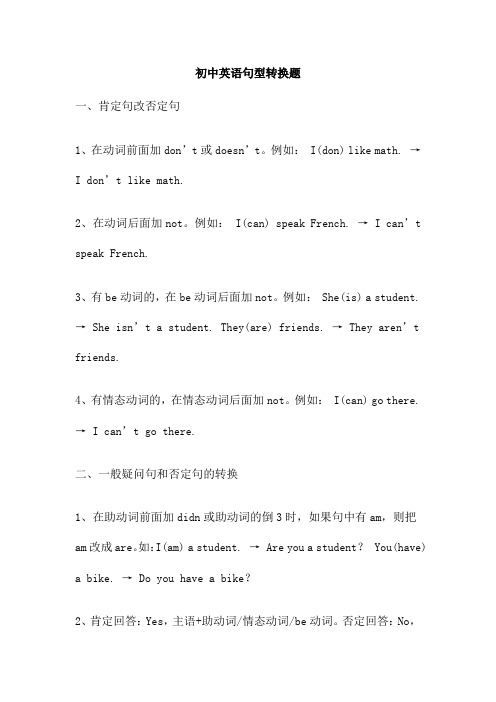
初中英语句型转换题一、肯定句改否定句1、在动词前面加don’t或doesn’t。
例如: I(don) like math. →I don’t like math.2、在动词后面加not。
例如: I(can) speak French. → I can’t speak French.3、有be动词的,在be动词后面加not。
例如: She(is) a student. → She isn’t a student. They(are) friends. → They aren’t friends.4、有情态动词的,在情态动词后面加not。
例如: I(can) go there. → I can’t go there.二、一般疑问句和否定句的转换1、在助动词前面加didn或助动词的倒3时,如果句中有am,则把am改成are。
如:I(am) a student. → Are you a student? You(have)a bike. → Do you have a bike?2、肯定回答:Yes,主语+助动词/情态动词/be动词。
否定回答:No,主语+助动词/情态动词/be动词 not。
如:—Are you a student?—Yes,I am./No,I am not.3、在情态动词或助动词前面加didn或助动词的倒3时,如果句中有was,则把was改成were。
如:He(was) here an hour ago. → Were you here an hour ago?4、就一般疑问句提问。
如:He(is) a doctor. → Is he a doctor?They(have) a car. → Do they have a car? We(will) go to school tomorrow. → Will we go to school tomorrow? They(can) swim. → Can they swim?5、就否定句提问。
初中句型转换专项
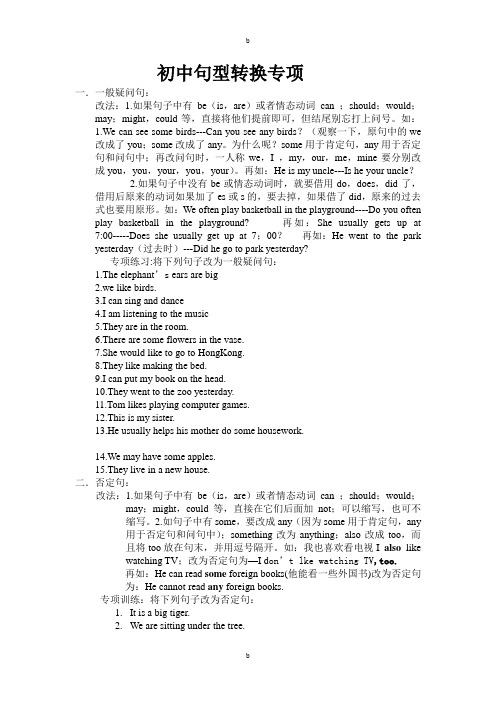
初中句型转换专项一.一般疑问句:改法:1.如果句子中有be(is,are)或者情态动词can ;should;would;may;might,could等,直接将他们提前即可,但结尾别忘打上问号。
如:1.We can see some birds---Can you see any birds?(观察一下,原句中的we改成了you;some改成了any。
为什么呢?some用于肯定句,any用于否定句和问句中;再改问句时,一人称we,I ,my,our,me,mine要分别改成you,you,your,you,your)。
再如:He is my uncle---Is he your uncle?2.如果句子中没有be或情态动词时,就要借用do,does,did了,借用后原来的动词如果加了es或s的,要去掉,如果借了did,原来的过去式也要用原形。
如:We often play basketball in the playground----Do you often play basketball in the playground? 再如:She usually gets up at 7:00-----Does she usually get up at 7;00?再如:He went to the park yesterday(过去时)---Did he go to park yesterday?专项练习:将下列句子改为一般疑问句:1.The elephant’s ears are big2.we like birds.3.I can sing and dance4.I am listening to the music5.They are in the room.6.There are some flowers in the vase.7.She would like to go to HongKong.8.They like making the bed.9.I can put my book on the head.10.They went to the zoo yesterday.11.Tom likes playing computer games.12.This is my sister.13.He usually helps his mother do some housework.14.We may have some apples.15.They live in a new house.二.否定句:改法:1.如果句子中有be(is,are)或者情态动词can ;should;would;may;might,could等,直接在它们后面加not;可以缩写,也可不缩写。
七年级英语句型转换题

七年级英语句型转换题英语句型转换是提高语言运用能力和理解能力的重要训练方法之一。
在七年级的英语学习中,句型转换可以帮助学生更好地掌握英语语法规则,提高句子的表达能力,增加对不同语言结构的理解。
下面将详细介绍一些七年级英语句型转换题。
一、陈述句与一般疑问句转换1. 陈述句:He is a student.一般疑问句:Is he a student?2. 陈述句:She plays tennis every Sunday.一般疑问句:Does she play tennis every Sunday?3. 陈述句:They have lunch at 12:00.一般疑问句:Do they have lunch at 12:00?4. 陈述句:We live in London.一般疑问句:Do we live in London?5. 陈述句:You like chocolate ice cream.一般疑问句:Do you like chocolate ice cream?二、一般疑问句与陈述句转换1. 一般疑问句:Can she swim?陈述句:She can swim.2. 一般疑问句:Have they been to Beijing?陈述句:They have been to Beijing.3. 一般疑问句:Is it raining?陈述句:It is raining.4. 一般疑问句:Did he watch TV last night?陈述句:He watched TV last night.5. 一般疑问句:Do you like pizza?陈述句:You like pizza.三、陈述句与否定句转换1. 陈述句:She is a doctor.否定句:She is not a doctor.2. 陈述句:I can swim.否定句:I cannot swim.3. 陈述句:We visit our grandparents every summer.否定句:We do not visit our grandparents every summer.4. 陈述句:He likes playing basketball.否定句:He does not like playing basketball.5. 陈述句:They have finished their homework.否定句:They have not finished their homework.四、特殊疑问句与陈述句转换1. 特殊疑问句:What is your name?陈述句:My name is Tom.2. 特殊疑问句:When did you wake up this morning?陈述句:I woke up this morning.3. 特殊疑问句:Where is the nearest supermarket?陈述句:The nearest supermarket is here.4. 特殊疑问句:How many students are there in your class?陈述句:There are 30 students in my class.5. 特殊疑问句:Why did you go to the park yesterday?陈述句:I went to the park yesterday for a picnic.通过以上的例题,可以看出七年级英语句型转换题主要包括陈述句与一般疑问句的转换、一般疑问句与陈述句的转换、陈述句与否定句的转换以及特殊疑问句与陈述句的转换等。
初中英语七年级必备-整理版-句型转换(陈述句变一般疑问句特殊疑问句及练习)
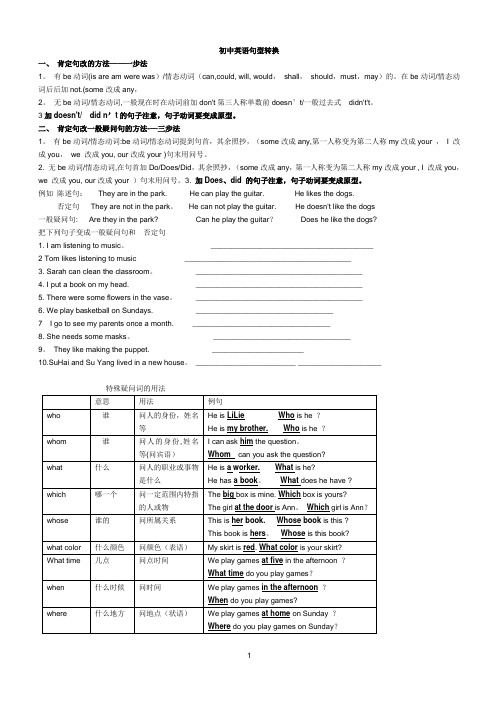
初中英语句型转换一、 肯定句改的方法——一步法1。
有 be 动词(is are am were was)/情态动词(can,could, will, would, shall, should,must,may)的。
在 be 动词/情态动 词后后加 not.(some 改成 any,2。
无 be 动词/情态动词,一般现在时在动词前加 don't 第三人称单数前 doesn’t/一般过去式 didn't't。
3 加 doesn't/ did n’t 的句子注意,句子动词要变成原型。
二、 肯定句改一般疑问句的方法-—三步法1。
有 be 动词/情态动词:be 动词/情态动词提到句首,其余照抄,(some 改成 any,第一人称变为第二人称 my 改成 your , I 改成 you, we 改成 you, our 改成 your )句末用问号。
2. 无 be 动词/情态动词,在句首加 Do/Does/Did,其余照抄,(some 改成 any,第一人称变为第二人称 my 改成 your , I 改成 you,we 改成 you, our 改成 your )句末用问号。
3. 加 Does、did 的句子注意,句子动词要变成原型。
例如 陈述句: They are in the park.He can play the guitar.否定句 They are not in the park。
He can not play the guitar.He likes the dogs. He doesn't like the dogs一般疑问句: Are they in the park?Can he play the guitar?Does he like the dogs?把下列句子变成一般疑问句和 否定句1. I am listening to music。
(完整)初中英语句型转换(陈述句变一般疑问句特殊疑问句及练习)
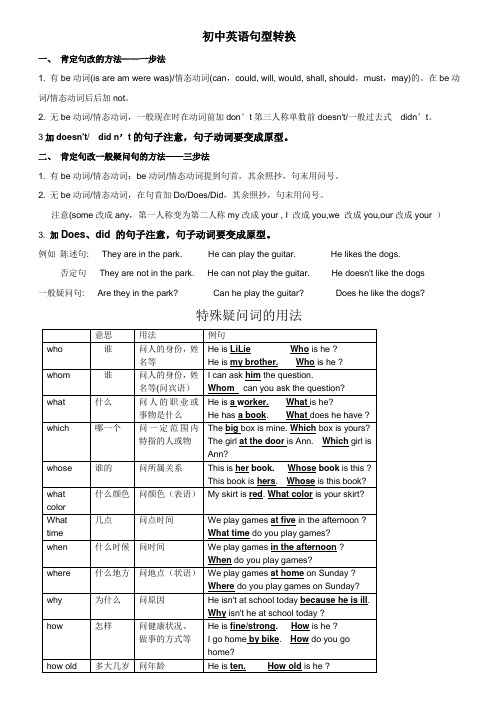
初中英语句型转换一、 肯定句改的方法——一步法1. 有 be 动词(is are am were was)/情态动词(can,could, will, would, shall, should,must,may)的。
在 be 动词/情态动词后后加 not。
2. 无 be 动词/情态动词,一般现在时在动词前加 don’t 第三人称单数前 doesn't/一般过去式 didn’t。
3 加 doesn't/ did n’t 的句子注意,句子动词要变成原型。
二、 肯定句改一般疑问句的方法——三步法1. 有 be 动词/情态动词:be 动词/情态动词提到句首,其余照抄,句末用问号。
2. 无 be 动词/情态动词,在句首加 Do/Does/Did,其余照抄,句末用问号。
注意(some 改成 any,第一人称变为第二人称 my 改成 your , I 改成 you,we 改成 you,our 改成 your )3. 加 Does、did 的句子注意,句子动词要变成原型。
例如 陈述句: They are in the park.He can play the guitar.He likes the dogs.否定句 They are not in the park. He can not play the guitar. He doesn't like the dogs一般疑问句: Are they in the park?Can he play the guitar?Does he like the dogs?特殊疑问词的用法who whom what whichwhose what color What time when where why howhow old意思 谁 谁什么 哪一个谁的 什么颜色用法 问人的身份,姓 名等 问人的身份,姓 名等(问宾语) 问人的职业或 事物是什么 问一定范围内 特指的人或物问所属关系问颜色(表语)例句He is LiLieWho is he ?He is my brother. Who is he ?I can ask him the question.Whom can you ask the question?He is a worker. What is he?He has a book. What does he have ?The big box is mine. Which box is yours?The girl at the door is Ann. Which girl isAnn?This is her book. Whose book is this ?This book is hers. Whose is this book?My skirt is red. What color is your skirt?几点 什么时候 什么地方 为什么 怎样多大几岁问点时间 问时间 问地点(状语) 问原因 问健康状况、 做事的方式等 问年龄We play games at five in the afternoon ? What time do you play games? We play games in the afternoon ? When do you play games? We play games at home on Sunday ? Where do you play games on Sunday? He isn't at school today because he is ill. Why isn't he at school today ? He is fine/strong. How is he ? I go home by bike. How do you go home? He is ten. How old is he ?how多少跟复数名词, There are thirty boys in my class.many问数量How many boys are there in your class?how多少跟不可数名词 There is some milk in the bottle.much问数量或价钱 How much milk is there in the bottle?how far 多远问路程It's five kilometers away from here?How far is it from here?how soon 多久问 in+一段时间 He can finish it in half an hour.How soon can he finish it ?how long 多久问一段时间, He has lived here for a year.问物体的长短 How long has he lived here?The desk is one meters long.How long is the desk ?how often 多久问频率I go to see my parents once a month.(一次)How often do you go to see your parents?How 的疑问句辨析一、how many 和 how much 的区别how many 用来询问可数名词的数量,它的句式是:How many+复数名词+一般疑问句+? how much 用来询问不可数名词的数量,也可询问价格。
[精]人教七年级英语句型转换大汇总
![[精]人教七年级英语句型转换大汇总](https://img.taocdn.com/s3/m/b4fd96b73169a4517623a33a.png)
七年级英语句型转换大汇总一、肯定句改否定句的方法1、在be动词后加not。
如:is not ,are not ,am not2、在can,should,will等后加not。
如:can not,should not,will not;3、上述都没有的,在动词前加助动词否定形式don’t/doesn’t/didn’t。
4、some 改成any。
如:①I am a girl. →I am not a girl.②You are a student.→You are not a student.→You aren’t a student.③This is Tom’s bag.→This is not Tom’s bag.→This isn’t Tom’s bag.二、肯定句改一般疑问句的方法1、把be动词放在句首,剩下的照抄,(some 改成any,I改成you,my改成your)句点改成问号。
2、把can,shall,will等放到句首,剩下的照抄,(some 改成any,I改成you,my改成your)句点改成问号。
3、上述都没有的,在句首请助动词Do/Does/Did帮忙,剩下的照抄,(some 改成any,I改成you,my改成your)句点改成问号。
注意:句首的第一个字母要大写,句尾标点应为“?”。
如:①I am in Class 6.→Are you in Class 6?②You are from America.→Are you from America?③It is an orange.→Is it an orange?4、就一般疑问句回答一般疑问句有两种回答,即:肯定回答和否定回答。
其中,肯定回答用yes,否定回答用no。
语句顺序为:Yes + 主语+ am /is/are/was/were.|can.|do/does/did|; No + 主语+ am not/ isn’t/ aren’t如:—Are you an English teacher?→Yes, I am. /No, I am not.—Is that a bird? →Yes, it is./ No, it isn’t.三、对划线部分提问“就划线部分提问”是小学阶段英语学习的难点,但是一旦掌握了规律,就变得容易多了。
初一英语语法--句型转换(详细内容)

初一英语语法--句型转换(详细内容)初一英语语法—句型转换内容:陈述句:肯定句否定句疑问句:一般疑问句特殊疑问句一.肯定句变否定句1.句子中有be,在be后加not。
(be动词有am , is , are, was, were)1)I am a student. I am not a student.2)They are blue . They aren’t blue.3) He is Kangkang. He is n’t Kangkang .4) I was ten last year. I wasn't ten yesterday.5) He was good at English. He wasn't good at English.6) They were at home last Sunday. They weren't at home last Sunday.练习:把下列句子变为否定句1.His father is an English teacher._____________________________2.He is crying under the tree. ___________________________ __3.He was thirteen years old two years ago._______________________4.They are very lucky.______________________________________5.t the family was poor.6.My voice was too weak.2.谓语是动词原形,在动词前加don’t。
7.I have a book . I don’t have a book.8.They like Chinese . They don’t like Chinese.9.3) We come from China. We don’t come from China.3.谓语动词是第三人称单数,在动词前加doesn’t,动词用原形。
- 1、下载文档前请自行甄别文档内容的完整性,平台不提供额外的编辑、内容补充、找答案等附加服务。
- 2、"仅部分预览"的文档,不可在线预览部分如存在完整性等问题,可反馈申请退款(可完整预览的文档不适用该条件!)。
- 3、如文档侵犯您的权益,请联系客服反馈,我们会尽快为您处理(人工客服工作时间:9:00-18:30)。
句型转换1.My mother is watching TV now. (用sometimes改写)My mother sometimes __________ ________ at home.2.Tom often plays football on Sundays. (划线提问)___________ _________ Tom often _________ on Sundays.3.He sleeps nine hours every night.(划线提问)_________ __________ ________ he sleep every night?4.He didn’t go to school yesterday. I think. (合并为一句)I _________ ________ he ________ _________ school yesterday.5.It’s important that we s hould eat a balanced diet. (同意句)It’s important _________ _________ _________ __________ a balanced diet.6.What’s the trouble with Tony? (同意句)________ ________ ________ with Tony?7.The boy has to play the piano every day.(一般疑问句)________ the boy _______ ________ play the piano every day?8.We hope that we can visit this place again.(同意句)We hope ________ ________ this place again.9.He decided to buy a new house.(同意句)He decided ________ __________ a new house.10.The Smiths are going to New York on May 10th.(划线提问)_________ __________ ___________ ___________ the Smiths going?11.The early bus takes him to school.(同意句)He __________ __________ __________ _________ to school.12.It took him about an hour to do his homework every day.(同意句)He_________ about an hour _________ __________ his homework every day.13.Lily lives about 10 kilometers from the airport.(划线提问)_________ _________ _________ Lily __________ from the airport.14.It was Friday, the 12th yesterday.(划线提问)_________ __________ yesterday?15.Wh y don’t you come and play soccer with us?(同意句)_______ __________ come and play soccer with us?16.They are busy studyingfor the test.(划线提问)_________ __________ they busy __________ ?17.I’m 13. he is 15.(合并句一句)I’m ________ __________________________ him.18.Both of us are good at schoolwork.(同意句)_______ are ________ goodat schoolwork.19.I have two apples,he has two apples ,too.(合并为一句)I have_______________ ________ ________ he.20.I think English is more difficult than the other subjects.(同意句)I don’t think the other subjects are ______ __________ ________ English.21.We need to have much water.(线提问)_________ ___________you________ __________ ________ ?22.My mother put in two teaspoons of butter.(划线提问)___________________ butter _________ your mother _______ in?23.There were some sharks .(一般疑问句并做否定回答)_______________________ sharks? No, there _________>24.My sister stayed there for two years.(划线提问)_____________________________ your sister _________ there?25.He began to learn the accordion when he was five years old.(同意句)________ _______ ________ _______ _______ , he began to learn the accordion.26.She wants to be a computer programmer .(同意句)She________________ ________ _________ a computer programmer.27.The student have a school trip in spring.(用next week 代替spring)The students ________ ________ ________ _________ a school trip next week.28.He is going to be an engineer when he grows up.(划线提问)_________ ishe going to ________ when he grows up?29.I have to stay at home because of the cold weather.(同意句)I have to stay at home _________ ________ _________.30.You took care of my dog when I was not at home . Thank you.(合并为一句)Thanks __________ ______ ________ _______ my dog when I was not at home.31.He is very young. He can’t carry the heavy box.(合并为一句)He is_______ _________ _________ carry the heavy box.32.The car is too expensive for me to buy it.(同意句)The car isn’t________ _____ for me to buy it.33.Jim likes apples better than any other fruit.(同意句)Jim likes apples _______ _________ _________ the fruits.34.He went to Beijing by train.(同意句)He _______ _______ _________ to Beijing.35.Tina bought a gift yesterday.(变为否定句)Tina ________ _________ a gift yesterday.36.Bob won the first prize in the competition three years ago.(划线提问)________ ________ Bob ________ the first prize in the competition?37. The kids are going to the zoo by bike.(划线提问)_______ _________ the kids ________ to the zoo?37.I can buy some drinks and snacks.(改为语气委婉的提问)_______ _________ _________ ___________ __________ ______ _______ ?38.Nobody is more active than Meimei.(同意句)Meimei is __________ __________ __________ of all.39.How much is your T-shirt?(同意句)________ the _________ of your T-shirt?40.Helen has the same idea as Gina.(同意句)Helen _________ __________ Gina.初二英语句型转换练习1.There’s no time to have lunch. (改反意疑问句)There’s no time to have lunch, ______ _______?2.What does he often do on Monday?(用last Monday改写)What _____ he _____ last Monday?3.Her brother likes apples very much.(改否定句)Her brother _______ like apples ______ _______.4.Jim couldn’t find the book on the desk. (改反意疑问句)Jim couldn’t find the book on the desk, ______ ______?5.I don’t think he can move the table. (改反意疑问句)I don’t think he can move the table, ______ ______?6.Both of the boys are good at swimming. (改否定句)_______ of the boys_____good at swimming.7.It’s wet and hot today. (就划线部分提问)What’s _____ _____________today?8.They lived there for twenty years. (就划线部分提问)______ ____________they live there?9.The teacher is talking with her father. (就划线部分提问)_____ _____ theteacher ________ _______?10.He has to do the washing on Saturday. (就划线部分提问)_____ _____he______ to _____ on Saturday?11.You teacher seemed angry. (改反意疑问句)Your teacher seemedangry,______ ______?12.We went to Wuhan every two years. (就划线部分提问)___________________ you ______ to Wuhan?13.My aunt went back ten months ago. (就划线部分提问)______ ______ youraunt go back?14.My brother has to drive the car. (改一般疑问句)______ _______brother______ to drive the car?15.We’ll have to eatmooncakes in the room. (改否定句)We ______ _______ toeat mooncakes in the room.16.He must do it today. (改反意疑问句)He must do it today, ______ _______?17.There is something wrong with the radio. (改否定句)There ______________wrong with the radio.18.Someone is in the room. (改反意疑问句)Someone is in the room,____________?19.The man said nothing for a moment. (就划线部分提问)______ ______ theman _____ for a moment?20.We can’t find the sign somewhere. (改一般疑问句)______ ______ find the sign __________?21.Both of the stories are interesting. (改否定句)_______ ______ the stories _____ interesting.22.You’d better go out at night. (改否定句)You’d ______ ______ go out at night.23.It’s a terrible cough. (改感叹句)______ ____ _________ cough!24.Either Jim or Kate will go to Hainan for the winter holidays. (否定句)_________ Jim ______ Kate will go to Hainan for the winter holidays.25.Mike watched TV last night.(就画线部分提问)_____ _____ Mike ______ last night?26.You mustn't play on the road.(改为祈使句)______ ______ on the road.27.Must I finish my homework today?(给出否定回答)______, you ______.28.He is a very clever boy.(改为感叹句)______ a ______ boy he ______!= _____ _______ the boy _____!29.Mrs. Green does some shopping every day.(完成反意疑问句)Mrs. Green does some shopping every day ,______ _______?30.His father took him to the park yesterday.(就画线部分提问)____________ his father ______ him to the park?31.There is some water in the bottle.(改为否定句)There ______ ______ water in the bottle32.She went to London by air yesterday.(就画线部分提问)______ ______ she ______ to London yesterday?33.You can't leave your son by himself, can you?(给出否定回答)______, I ______.34.The weather is very bad.(改为感叹句)______ ______ weather!35.We ran to the tree. We couldn't see any moremonkeys.(把两个简单句连成一个并列句)We ran to the tree, ______ we couldn't see any more monkeys.36.It took me two hours to mend the bike.(就画线部分提问)__________________ it ______ you to mend the bike?37.I turned on the radio. We sat down and listened to the music.(把两个简单句连成一个并列句)I turned on the radio _____ we sat down and listened to the music.38. Turn off the radio. (改反意疑问句)Turn off the radio, _________ ________?39.The boy is so strong. He can carry the heavy box.(把两个句子合并成一个句子)The boy is _________ ________ to carry the heavy box.40. He told me to bring some food. (变成否定句))He ______ me______________ bring ______ food.41.He is a boy of five. He can speak a little English. (连成并列句)He is a boy offive, _______ he can speak a little English.42. Both you and I are happy. (变成否定句)_____ you ________ I________happy.43.Swimming is my favourite.(同义句转换)My ________sport is________.44.Let's cook something English. (变成反意疑问句)Let's cook somethingEnglish,________ ________?45.I like chicken than any of others.(同义句转换)I like chicken _________________.47.He likes cabbages. (用tomatoes改成选择疑问句)________ he________cabbages ________ ________?48.I’ll tell my father about it tomorrow. (用yesterday 改写句子)I ________ myfather about it ________.49.This kind of food is delicious. (变成感叹句)________ ________ this kind offood is!50.There is something interesting in today's newspaper.(变一般疑问句)________ ________ _______ interesting in today's newspaper?51.Tom is writing the new words on the blackboard.(就划线部分提问)________ ________ Tom________?52.They are going to leave at nine. (就划线部分提问)________ ________ are they going to leave?53.Mr. Smith usually goes to work by bike.(就划线部分提问)________ ________ Mr. Smith usually ________ to work?54.Tim always has supper at home.(改为一般疑问句)________Tim ________ ________ supper at home?55..my pencil, your pencil, long (用…than…连成一个句子)。
